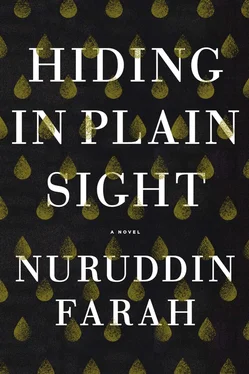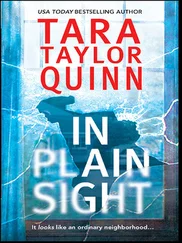She gets out of bed naked and moves about the room soundlessly, as if there were someone else asleep in the room. And now she remembers her dream as well, a dream in which she shared a bed with HandsomeBoy Ngulu and they lay in each other’s embrace, her heart beating furiously, as if it wanted to break out and flee. She walks into the bathroom and stares hard into the mirror, berating herself for having such thoughts so soon after Aar’s passing. What sort of a person is she, giving in to desire when there is so much at stake, when there is a lot to be done?
The sight of her reflection surprises her. Her eyes are swollen and bruised looking, and she wonders if she cried in her sleep. She looks roughed up and sad, off-kilter on a morning when she needs to be efficient and at her faultless best. Despair is not an option. She scolds herself, speaking directly into the mirror, getting closer and closer until she can see a cloud of breath on the mirror’s surface.
She takes a selfie, a habit that dates to long before she had an iPhone. Whenever she was in a fix and unsure of how to proceed, she’d place herself at an angle to a mirror and take a photograph so that she could talk to it. Sometimes she would even tell herself folktales. It’s working, she sees, as she looks at the photo on her iPhone. There’s a little relief in her face, as if she’s starting to have faith in herself again.
—
Bella slips on a robe. In preparation for Valerie’s visit, Bella puts her belongings all around Aar’s room. She doesn’t want there to be any mistake about who’s in charge here. She puts her clothing in the closet and dresser, pushing aside Aar’s to make room and leaving her suitcases on the floor. She opens every drawer in the room, taking a quick inventory of the contents. Some things she buries away from Valerie’s prying eyes; others she locks away in Aar’s study, the key to which the children have given her and she stashes in one of her camera cases.
It strikes her how flat-footed sudden death catches its victims. Hurdo used to say that a woman must always be prepared for life’s surprises — her toenails trimmed, her hands manicured, her underpants clean, nothing left to chance. She may have had an exaggerated sense of preparedness, but Bella has to agree now that perhaps her mother had a point. She sees Aar’s unpreparedness everywhere — in the open documents in his study, in the packed suitcase he didn’t take with him.
It does not take her long to open the larger suitcase. She is pretty certain that he uses variants on her name, nickname, or date of birth as his secret code for almost all locks, bank accounts, and other such things, just as she uses his. Inside, she finds several shirts, jeans, and underwear, along with his extra Mac, a wallet bursting with cash in dollars and several credit cards, and next to it is a printout of an e-mail addressed to Gunilla and signed “With love.” In the letter, he explains that he is going to be in Mogadiscio for three months and asks Gunilla to please prepare all the legal documentation they’ve been discussing and have it initialed and then sent to him for signing before departure. He also requests that she make two copies of his “important documents,” keeping one set and sending the other to him. Bella can’t follow all the particulars — if anything, the state of affairs mirrors a general sense of lack of urgency — a man behaving as if he had all the time in the world and that he will be around for some time. These signs are what his belongings convey. At the same time, the discovery mirrors a sense Bella’s had since Istanbul that he’d been confiding in someone else. That someone else appears to be Gunilla. Bella has come to Nairobi prepared with all the legal documentation that she might need to prove her identity. On top of all this, she has a signed and notarized document attesting to the fact that she, Aar’s sister, is also his one and only executor. But it is Gunilla who has in her possession the items he deposited with the liaison office in Nairobi, and for those, she must await Gunilla’s return. Bella reminds herself to ring the Swede, who is supposed to be returning tonight, first thing tomorrow morning to arrange a meeting.
When Bella questioned Aar during their time in Istanbul if it made sense to sink all his savings in a house of stone in a volatile country like Kenya and not in Mogadiscio, where, even though things were bad, there was the possibility of peace returning and property starting to appreciate again, Aar told her that he no longer thought of Mogadiscio as home. “Home,” he said, “is where my children are, where they live and go to school and love to be. Besides,” he added, after a thoughtful pause, “I am uncomfortable affiliating myself with a country broken into fiefdoms, where there is no room for someone like you or me.”
They were at the Blue Mosque, where they admired the elegance of construction and the colorful tiles and silk carpets. They continued their talk while visiting the nearby Topkapı Palace. Aar said, “I am not comfortable in a Mogadiscio run by a confederacy of clans that are in cahoots with religious renegades. There is a great ache in my heart every time I drive past the cathedral and the oldest mosque, both of which lie in ruins.”
A knock on the door gives Bella a start. Then she calls, “Come in,” and Dahaba walks in, leaving the door ajar. Bella realizes that she is instinctively blocking her niece’s view of the rest of the room, perhaps because she doesn’t want anyone else to know about the broad sweep of her own intentions.
Dahaba asks, “What are you doing?”
“N-nothing!” Bella stammers.
Dahaba walks farther into the room and looks around, as if checking that everything remains as her father left it — except for a half-open drawer, which she now goes to.
“You looking for something?” Bella asks.
“Do you have any tampons, Auntie?” While Bella rummages for some in her travel case, Dahaba says, “What is the word for tampons in Somali?”
Bella chuckles. “I doubt we have a word for it.” Then she remembers how in her youth, when tampons were not yet available in Somalia, women back home had to make use of strips of cotton, which had to be washed several times a day. In the Mogadiscio of the late eighties, they were again difficult to obtain; in those days, pharmacies would run out of all manner of daily necessities.
“Here,” she says, giving Dahaba several.
Dahaba dashes out of the room, and Bella pushes the door gently shut on the pretext that she will be changing. Then she resumes searching the room, albeit with consummate caution. But she doesn’t lock the door, not wanting either Dahaba or Salif to suspect her of foraging among their dad’s things. Bella is certain that even Aar had secrets somewhere, but this is not something the offspring of a beloved parent find easy to believe.
Another knock on the door puts a stop to Bella’s search.
This time it is Salif. “Would you like me to book a table at a restaurant if Mum and Padmini are joining us?” he says through the door.
Bella opens the door, but he is too timid to look at her because she is not yet decently dressed. What a charming, sweet boy, she thinks, as he stares at his fingernails.
“Which would you rather do, go out or bring in takeaway?” she asks. “For me, either is fine.”
“Let’s eat in,” he says. “There is more privacy here.”
“I see your point,” she says.
“And they may be late.”
She wonders if she should mention that their mother was close to an hour late yesterday evening. But all she says is, “Fair enough. The food can wait if they are late, and we can warm it up in the microwave.”
He says, “You know that whatever we decide either Mom or Dahaba will fuss about it. But you know what?”
Читать дальше












